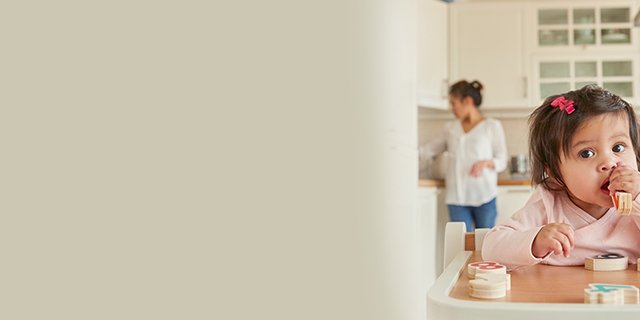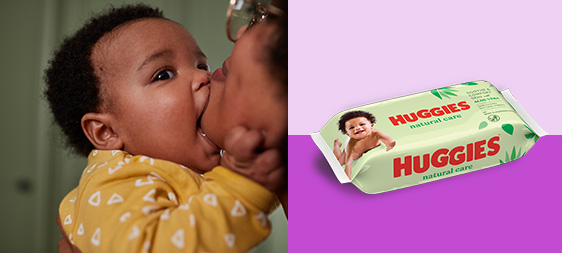Diet plays a critically important role in the health of your child’s teeth. Developing healthy eating habits early in life will help ensure strong and healthy adult teeth.
Good oral health during infancy and the toddler years contributes to better dental health throughout life, with less dental decay and lower rates of missing teeth.
Rising decay rates in children have been related to changed dietary patterns, with fewer children drinking fluoridated tap water, and the increased frequency of consumption of sugary, processed foods and drinks.
Encouraging healthy eating and drinking habits in babies and toddlers are the best ways to help your child have healthy teeth for life.
Early Childhood Caries
As soon as your baby develops their first tooth, they are at risk of dental decay. This type of decay in babies and toddlers is known as Early Childhood Caries (ECC). To help prevent ECC, follow the guidelines below:
If your baby has teeth, don’t settle them to sleep with a breastfeed or bottle of milk, sweetened flavoured milk, cordial, soft drink or fruit juice. Bacteria feed on the sugar in these drinks and form plaque acids on the teeth, which eat into the tooth surface and cause decay.
Never allow your child to take a bottle of milk or other sugary beverages to bed. When they are older, it is fine to place water on their bedside table in case they get thirsty overnight.
If your baby likes to suck on something to settle them to sleep, offer a dummy or a bottle of water.
If your baby has a breastfeed or bottle of milk before bed, then gently wipe down their teeth with a moistened, clean facecloth before putting them to bed.
Another contributing factor is overnight feeding of a child is over the age of 12 months . Speak with your healthcare professional if your baby still needs an overnight feed.
Avoid giving your baby or toddler frequent snacks; 3 meals and 2 snacks per day is sufficient to meet dietary needs.
If your baby suffers from a dry mouth (lack of saliva) and is a mouth breather, they are at greater risk of ECC. Speak with your healthcare professional or dentist if you think your baby may suffer from a dry mouth.
Good oral hygiene begins at birth. See article on oral hygiene for babies and toddlers.
Start phasing out breast- and bottle feeding from 12 months of age and encourage your baby to learn to drink from a cup.
What food contributes to dental decay?
Foods that can contribute to dental decay include those high in refined carbohydrates (sugar), such as concentrated fruit snack bars, lollies, muesli bars, sweet biscuits, some breakfast cereals and sugary drinks and juices. This is because the sugar feeds the destructive bacteria in your baby or toddler’s mouth. The bacteria produce acid which destroys your child’s teeth.
Highly refined packaged foods such as savoury crackers and chips can also have high levels of carbohydrates (sugars). Therefore it is important to check the nutritional information panel on packaged foods to help work out which foods and drinks have high carbohydrate and sugar levels.
These types of foods are high risk for causing decay, especially if eaten often and over long periods.
While it is unrealistic to completely cut these foods out, here are some tips to help minimise dental decay:
Enjoy a wide variety of nutritious foods, especially those rich in calcium and low in acids and sugars.
Enjoy healthy snacks such as cheese and fruit. Some foods help protect teeth – milk and some cheeses have protective qualities to help prevent dental decay.
Offer a diet high in fresh fruit and vegetables, wholegrain cereals, lean meats and dairy products.
Limit sugary snacks such as lollies, fruit and muesli bars, biscuits, dried fruit, cordials, juices and soft drinks.
Many healthy foods contain high amounts of sugar. Starchy foods (such as bread, pasta, crackers) and milk products consumed frequently can cause the growth of dental plaque (bacteria), which is why you need to make sure your child’s teeth are cleaned morning and night.
Importantly, a healthy diet must be complemented by good oral hygiene – brushing and flossing teeth and regular dental check-ups. Daily flossing and brushing greatly reduce the risk of tooth decay.
Did you know?
Some medicines contain sugar for taste. If your child is prescribed medicine, ask your doctor if this can be sugar free.
Foods containing sugar substitutes appear to reduce decay-causing bacteria. Xylitol is a natural sweetener. Ask your dentist if xylitol products (such as cough syrups or lozenges) would be useful in reducing your children’s risk of tooth decay.
Fluoride is especially good for strengthening young teeth
Fluoride is a natural mineral that strengthens teeth and protects against decay. All tap water in South Africa is fluoridated.
Bottled water usually does not contain enough fluoride to offer protection against tooth decay. Some home water filters remove fluoride from tap water and storage-tank water does not contain fluoride. If your child drinks the majority of their water from bottled or filtered water or tanks, then talk to your dentist about your child’s individual fluoride needs. If necessary, the dentist can apply ‘topical’ fluoride to their teeth, which has been proven to reduce childhood tooth decay.
Did you know?
Most people are aware that soft drinks contribute to tooth decay due to the significant amount of sugar that these drinks contain – a 600 ml bottle can contain up to 13 teaspoons of sugar.
Less well known is that these drinks, along with fruit juices, cordials and sports drinks often have high acid levels, and can play a major role in the development of tooth erosion and their intake should be limited. Tooth erosion is a silent epidemic. Encourage your child to drink fluoridated water as much as possible.




























